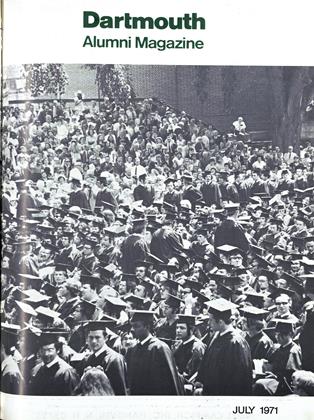Robert E. Short is a successful Midwest trucking magnate who also happens to own the Washington Senators, the ones who play baseball. His reputation as a gambler, when it comes to baseball anyway, is tattooed in the multi-figure contracts he's made in recent times with a flaky pitcher named Denny McLain (once of Detroit Tigers fame) and an outfielder named Curt Flood (who preferred to challenge baseball's reserve clause rather than accept his fate when traded by the St. Louis Cardinals to the Philadelphia Phillies). Mr. Short subsequently purchased Flood's contract and now has one of baseball's highest paid players. The only problem is that Flood has chosen to forsake baseball and is now somewhere in Europe—meditating.
Bob Short's gambling instincts reached the Dartmouth campus on June 9 when he chose to make Pete Broberg the No. 1 choice in the major league's secondary draft (involving players previously drafted but unsigned to a professional contract).
Broberg, son of Gus Broberg '41, the Ail-American basketball player, is an Adonis-looking soul who, even to the most uneducated eye, has one of the best fast balls anywhere. He followed Ms father's footsteps to Dartmouth in 968 after a spectacular scholastic career in Palm Beach, Fla., that prompted another dealer in longshots, Charlie Finley (owner of the Oakland Athletics), to offer a reported bonus of 75,000 for Broberg's signature.
When he refused Mr. Finley's offer, Broberg turned his back on professional baseball until his 21st birthday (which was this past March). He came to Hanover, played a season of freshman asketball, and then turned exclusively 10 baseball.
As a freshman, Broberg had a 6-0 a for the Little Indians, including a pair of no-hitters. In 1970, as a sophornore, he was 6-2. That record was as deceiving as his 5-5 record this spring. A year ago, Broberg worked 69- plus innings and had a 2.34 earned-run average. He walked 59 and struck out
This spring, his earned run average was a much-improved 1.43. He started and completed 10 games, pitched 82 innings and set a Dartmouth record for strikeouts in a season (127) and in a game (20 vs. Boston College).
Twice he was beaten in 1-0 games by Harvard and Springfield. In a 2-1 win over Princeton in which he struck out 14, Broberg also drove home the winning run in the last of the ninth inning with a two-out single.
Dartmouth's home baseball games usually draw good crowds and this spring the attendance was enhanced by an abundance of major league scouts who gazed at every Broberg pitch.
The Senators had first pick in the draft and went for the big Dartmouth righthander. Coincidentally, in another phase of the secondary draft, the Chicago White Sox came into the Ivy League for the first pick—Harvard catcher Pete Varney.
Two days after he was drafted, Broberg and his parents met with Short in Washington, D.C. When the meeting was. over, Broberg agreed to a "substantial" bonus (reported in the area of the earlier offer by Oakland) and reported directly to the Senators, then playing on the West Coast.
Broberg's plans are to complete his education at Dartmouth and then follow his father into law. "We're in thorough accord with Pete's educational ambitions," said Short. "This will not be a barrier in his quest to become an outstanding major league performer."
The only barrier for Broberg now is a lot of awfully good major league hitters.
"Three years ago, I think I'd have been eaten alive in the majors," said Broberg as he departed for Washington. "Now I think I'm better prepared to meet the challenge."
Now Bob Short can sit back and ponder his latest investment.
Pitcher Pete Broberg '72, the No. 1selection in the major league draft, isnow with the Washington Senators.
 View Full Issue
View Full Issue
More From This Issue
-
 Feature
FeatureThe Commencement Address
July 1971 By GUNNAR MYRDAL, Sc.D. '71 -
 Feature
FeatureAlumni Council Honors Seven
July 1971 -
 Feature
FeatureThe Fifty-Year Address
July 1971 By JOHN L. SULLIVAN '21 -
 Feature
FeatureHONORARY DEGREE CITATIONS
July 1971 By honoris causa. -
 Feature
FeatureCOMMENCEMENT 1971
July 1971 By CHARLES J. KERSHNER -
 Feature
FeatureMcCulloch Heads Council
July 1971
JACK DEGANGE
-
 Article
ArticleGREEN JOTTINGS
JUNE 1970 By JACK DEGANGE -
 Article
ArticleTRACK
JUNE 1971 By JACK DEGANGE -
 Article
ArticleGREEN JOTTINGS
JUNE 1972 By JACK DEGANGE -
 Article
ArticleWhere the Grass Looks Green
May 1975 By JACK DEGANGE -
 Feature
FeatureConundrum of the Gridiron
October 1978 By Jack DeGange -
 Article
ArticleHeritage Tourism
NOVEMBER 1999 By Jack DeGange
Article
-
 Article
ArticleINSPECTION OF TUBERCULAR SANITARIUM
-
 Article
ArticleCOLLEGE CREDIT TO BE GIVEN FOR EUROPEAN STUDY TOUR
April, 1922 -
 Article
ArticleDCAC "Football News"
July 1957 -
 Article
ArticleSpotted Record
April 1952 By C. E. W -
 Article
ArticleAround the World in Two Terms
December 1960 By D.E.O. -
 Article
ArticleMetropolitan Notes
December 1938 By Milburn McCarty Jr. '35.

